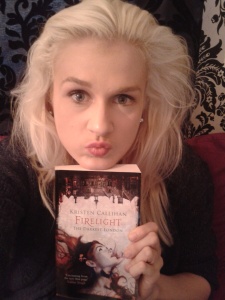 So, my last blog post was on Kirsten Callihan’s NFL romance, The Game Plan. This book, prescribed by Mills & Boon’s inter-office book club, had mixed responses across the office, but I absolutely loved it. So I had to wonder if Kirsten Callihan just a one-trick pony, or if she was an author I could really stick with. When I discovered that she wrote Gothic Victorian historical magical-realism (try saying that after three margaritas), a sub-genre so up my street that it’s practically wearing my jeans, I figured I had to try it.
So, my last blog post was on Kirsten Callihan’s NFL romance, The Game Plan. This book, prescribed by Mills & Boon’s inter-office book club, had mixed responses across the office, but I absolutely loved it. So I had to wonder if Kirsten Callihan just a one-trick pony, or if she was an author I could really stick with. When I discovered that she wrote Gothic Victorian historical magical-realism (try saying that after three margaritas), a sub-genre so up my street that it’s practically wearing my jeans, I figured I had to try it.
Firelight is, effectively, a romantic Beauty and the Beast update set in Victorian London. Miranda has been cursed by uncontrollable magical powers since birth, the unfortunate use of which has led to her family’s ruin, and a quick marriage is her only solution. Lord Archer, also, is cursed, forced to distance himself from society – but he’s loved Miranda from a distance for years. Marrying her when she cannot afford not to is unfair, but he cannot resist her.
I have decidedly mixed feelings about this book. Partly this is because the Beauty and the Beast trope is one of my favourites: I love the Disney film, the Robin McKinley update Beauty, both Angela Carter’s retellings in her fairy-tale short story collection The Bloody Chamber. My blog is named after it, my photo header is of the library in Disney’s version. But however you retell it, adapt it or are influenced by it, I believe in using it so subtly that it can scarcely be detected, or go whole-hog and run with it. This does neither. It doesn’t give me the thrill of everything that I love about the original story (primarily, the hero’s isolation from society, his emotional reliance on the heroine), it just feels weakly derivative. It undermines the other great ideas of the story, rather than supporting them. It limits them by holding the plot to the confines of something it scarcely need fit.
The sex scenes were frustrating in that – to be blunt – there wasn’t enough of it. In The Game Plan, the two protagonists pretty much get it on straight away, which I really enjoyed as it made a nice change from dragging the tension out for two hundred pages. However, Firelight makes me wonder if Callihan just used the sex scenes as a substitute for emotional development. They don’t actually have full sex until three-quarters of the way through, and the scene is fundamentally unsatisfying because the characters have no real dynamic. For complicated reasons, Archer wears a mask throughout the book, and I find it difficult to emotionally connect with a hero when I can’t picture him. Call me shallow, but I need my romantic heroes to be hot. But then, the conversation between him and Miranda doesn’t really go far enough to remedy it, and a good romance author ought to be able to achieve that.
There are things here that I like. The heroine’s believably Victorian but with a fully working backbone, the settings are gorgeous, and honestly, the idea behind the story is great. The mythology at work here – a group of people given life-enhancing abilities, but devastating physical and emotional consequences, is interesting, and vaguely reminds me of the way vampires were being written about in the Twilight-era of YA fiction. It also recalls something of the Victorian obsession with playing God, as in Frankenstein. But it’s undermined at every turn. I wanted Miranda to find out about Archer’s condition far sooner, so that there could actually be some exploration of her feelings about this; instead we just get a blind acceptance that cheapens their relationship. In the build up they spend more time ignoring each other and moping than actually speaking. To maintain the great mystery of what’s-wrong-with-Archer, Callihan doesn’t tell the reader the truth about him either, which is frustrating and feels like a missed opportunity as there’s something so interesting to discuss. Callihan also, unfortunately, resorts to stereotype, and an ‘another woman’ subplot. Letting it linger in the story makes Archer look like a dick, and Miranda look pathetic.
The ending, consequently, feels nothing if not hollow. Robin McKinley’s Beauty is a far simpler, less complex re-telling of the original fairytale, truer to the original and arguably less creative, but the ending is sublime, genuinely heart-warming, and will leave me smiling for hours because it is so much more sincere and loving. For that reason, I have read it more times than I can count. I think that Callihan’s mistake is to underestimate the power of the trope she seeks to use: she thinks that she can write all over it, manipulate it to her purposes, and get away with it. But la belle et le bete is bigger and stronger than her abilities, and its presence weakens her storytelling.
I guess the lesson here is to respect the history of literature, tradition and convention: respect that it’s there, that it matters, and that’s woven its way into vast depths of literary culture and history. Play with it by all means, but play with due reverence. And if you can’t do that, if you don’t know better, stick to writing romp.